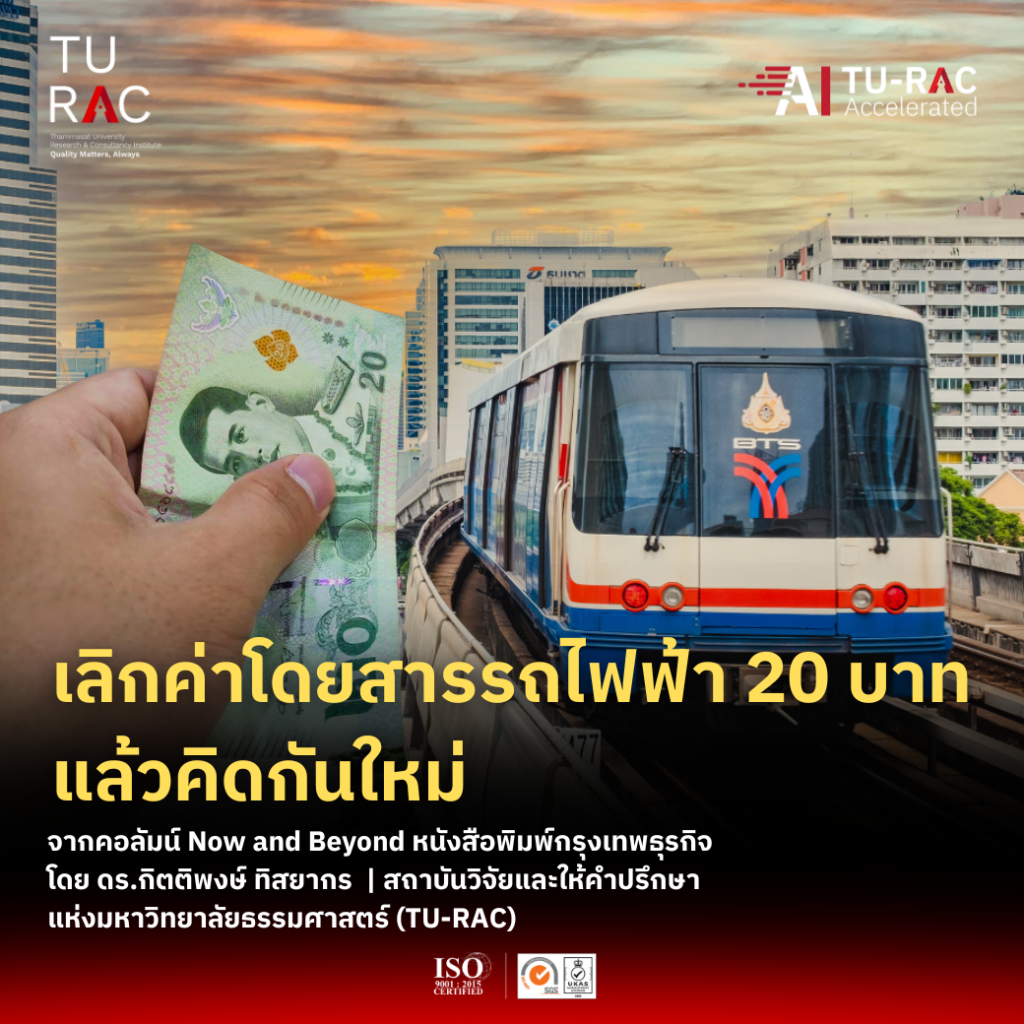TU-RAC ชวนอ่านบทความจากกรุงเทพธุรกิจ ในคอลัมน์ Now and Beyond by TU-RAC ทุกวันพฤหัสบดี ในหนังสือพิมพ์กรุงเทพธุรกิจ และกรุงเทพธุรกิจออนไลน์ เรื่อง เลิกค่าโดยสารรถไฟฟ้า 20 บาท แล้วคิดกันใหม่ โดย ดร.กิตติพงษ์ ทิสยากร สถาบันวิจัยและให้คำปรึกษาแห่งมหาวิทยาลัยธรรมศาสตร์ (TU-RAC)
.
กรุงเทพมหานครเผชิญปัญหาระบบขนส่งซับซ้อนและเรื้อรัง ส่งผลให้เกิดการจราจรติดขัด มลพิษทางอากาศ ภาระค่าใช้จ่ายในการเดินทาง และความเหลื่อมล้ำในการเข้าถึงโครงสร้างพื้นฐาน
.
นโยบายค่าโดยสารรถไฟฟ้า 20 บาทตลอดสาย เป็นยารักษาโรคที่ไม่ตรงจุด เพราะขาดการบูรณาการที่ทำให้ประชาชนเข้าถึงระบบขนส่งได้อย่างทั่วถึง และ สร้างภาระงบประมาณมหาศาลซึ่งไม่ยั่งยืนทางการเงิน แนวทางแก้ไขที่ยั่งยืนควรนำโมเดล “Rail + Property” จากต่างประเทศมาใช้ โดยนำรายได้จากการพัฒนาอสังหาริมทรัพย์รอบสถานีมาสนับสนุนระบบรถไฟฟ้า ควบคู่กับหลักการ Land Value Capture (เก็บคืนประโยชน์จากมูลค่าที่ดินที่เพิ่มขึ้น) และส่งเสริม ความร่วมมือระหว่างรัฐและเอกชน (PPP)
.
นอกจากนี้ การสร้าง ระบบนิเวศการเดินทาง (Mobility Ecosystem) ที่ครบวงจร ก็เป็นสิ่งจำเป็น โดยจัดตั้ง หน่วยงานกลางบริหารจัดการ (Central Clearing House) และใช้ เครื่องมือทางเศรษฐศาสตร์ เช่น Congestion Pricing เพื่อจูงใจให้คนลดใช้รถยนต์ส่วนตัว รายละเอียดเพิ่มเติม : https://www.bangkokbiznews.com/business/economic/1198971
20-Baht Fare Is Not the Final Answer: Accelerating the Creation of a Comprehensive Mobility Ecosystem
.
TU-RAC invites you to read the latest article in the Now and Beyond by TU-RAC column, published every Thursday in Bangkok Biz News newspaper and online. This week’s article, titled “Moving Beyond the 20-Baht Fare Policy” by Dr. Kittipong Tissayakorn, Thammasat University Research and Consultancy Institute (TU-RAC), explores the future of Bangkok’s transport policy.
Bangkok continues to face chronic transportation challengesincluding severe traffic congestion, air pollution, high commuting costs, and inequitable access to infrastructure.
The flat 20-baht fare policy for electric trains is a misaligned remedy, lacking the integration needed to ensure equitable access to public transport while imposing a heavy fiscal burden that is financially unsustainable.
A sustainable solution should adopt international models such as “Rail + Property”, where revenues from property development around train stations support the transit system. This approach should be combined with Land Value Capture—reclaiming part of the increased land value generated by transit investment—alongside public-private partnerships (PPP) to strengthen financial and operational sustainability.
Equally important is the creation of a comprehensive Mobility Ecosystem, including the establishment of a Central Clearing House for unified management, and the application of economic tools such as congestion pricing to incentivize reduced reliance on private cars.
More details: https://www.bangkokbiznews.com/business/economic/1198971



